A police officer with a conscience who left Belarus
- Published
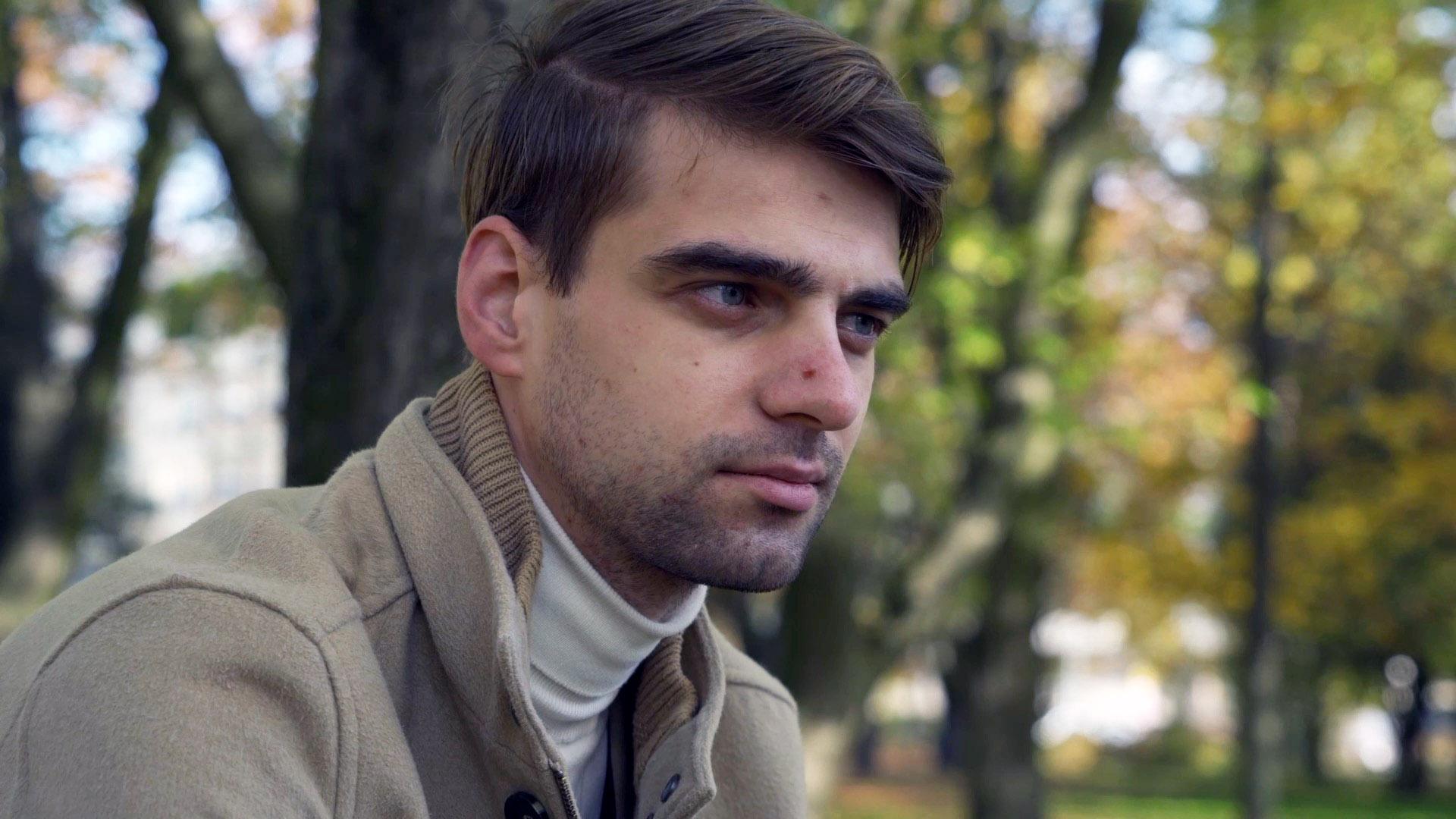
Andrei Ostapovich was a high-flying young police investigator in Belarus when protests broke out earlier this year, in the wake of the country's disputed presidential election. He was so horrified by the beating and torture of demonstrators in custody that he left the country. He's one of hundreds of Belarusian police officers now in exile in Poland and the Baltic states.
Sitting on a Warsaw park bench in the autumn sunlight, Andrei Ostapovich is lost in thought. He's oblivious to the couples strolling past, to the laughing teenagers and to the grandmother and toddler feeding the ducks a few metres away. With his sharp cheekbones and olive green eyes, the 27-year-old could almost be mistaken for a guy modelling Italian knitwear or promoting an expensive brand of aftershave. But Andrei is a policeman on the run.
Strictly speaking, Andrei is not running any more - he feels relatively safe in Poland. But when he decided to quit his job as a high-flying detective in the Belarusian capital, Minsk this summer, he realised he would have to leave the country straight away or risk arrest.
"I've been in police uniform for the past 10 years," he says. "But after the elections in August, I thought I was no longer safe wearing it because of the way people now feel about the police. My uniform made me ashamed"
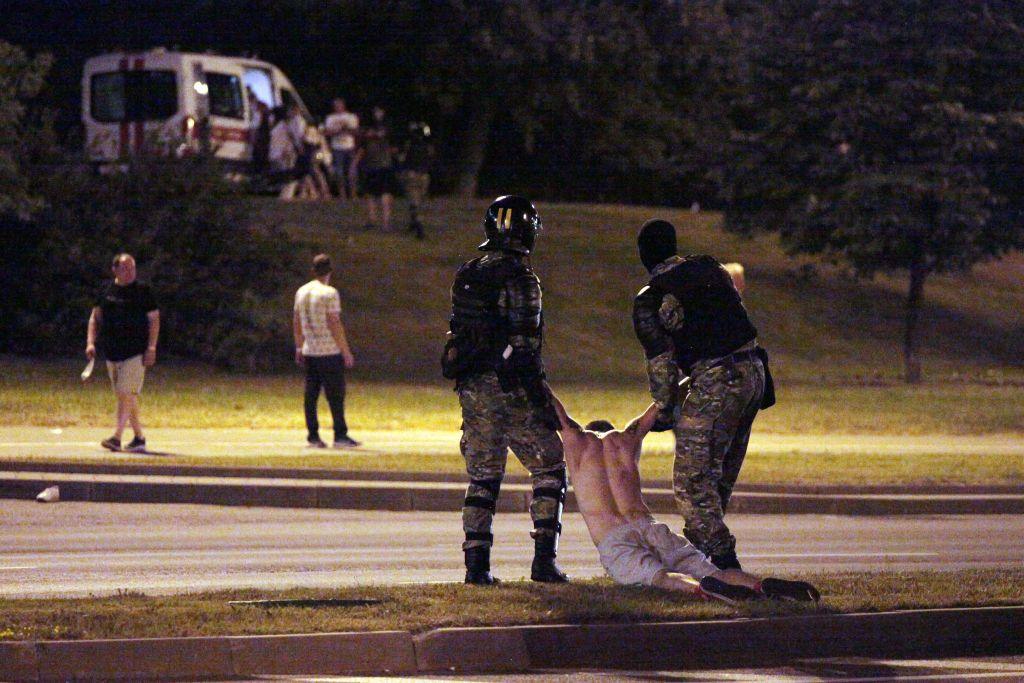
A demonstrator is arrested on 9 August
Brought up in the Grodno region, near the Polish border, Andrei's bravery and quick wittedness was first spotted when, aged 15, he saved a younger boy from drowning in a lake. Local firemen and paramedics were so impressed by the rescue that they suggested he might like a job with them after he left school.
But Andrei had other plans. After five years at an academy attached to the Ministry of Internal Affairs, where he studied law and forensics, he qualified as an investigator. He began with probes into medical negligence and just three months after graduation he made a name for himself by catching a notorious paedophile. He soon moved on to some of the country's most complex murder cases.
"The job was really exciting," he tells me, sucking hard on a cigarette. "There were interesting cases in which the suspects proved elusive and it was such a thrill when you managed to outsmart them - like winning a game of chess."
He says there was little political interference in his work as a senior investigator. But as elections approached he was troubled by the arrest of presidential candidates - a banker, Viktor Babaryko and blogger Sergei Tikhanovsky - on the flimsiest of pretexts.
Listen to Across the Barricades on the BBC World Service - click here for transmission times
Official results after the 9 August poll gave Alexander Lukashenko a landslide victory and a sixth term in office. But many both inside and outside Belarus were certain that the voting had been rigged. People took to the streets in unprecedented numbers demanding the resignation of the former collective farm boss who has ruled the country for the last 26 years.
Andrei went to the rallies after work to see what was going on. He found himself running for cover as police fired rubber bullets and stun grenades into the crowd.
What he saw with his own eyes - and in videos posted online - sickened him. So although he loved his job, he wrote a five-page letter of resignation, detailing all the abuses he'd witnessed, stating that the riot police "were the only people who provoked violence" and claiming that they had executed "criminal orders". Fully aware that he might face arrest, he fled across the border to Russia.
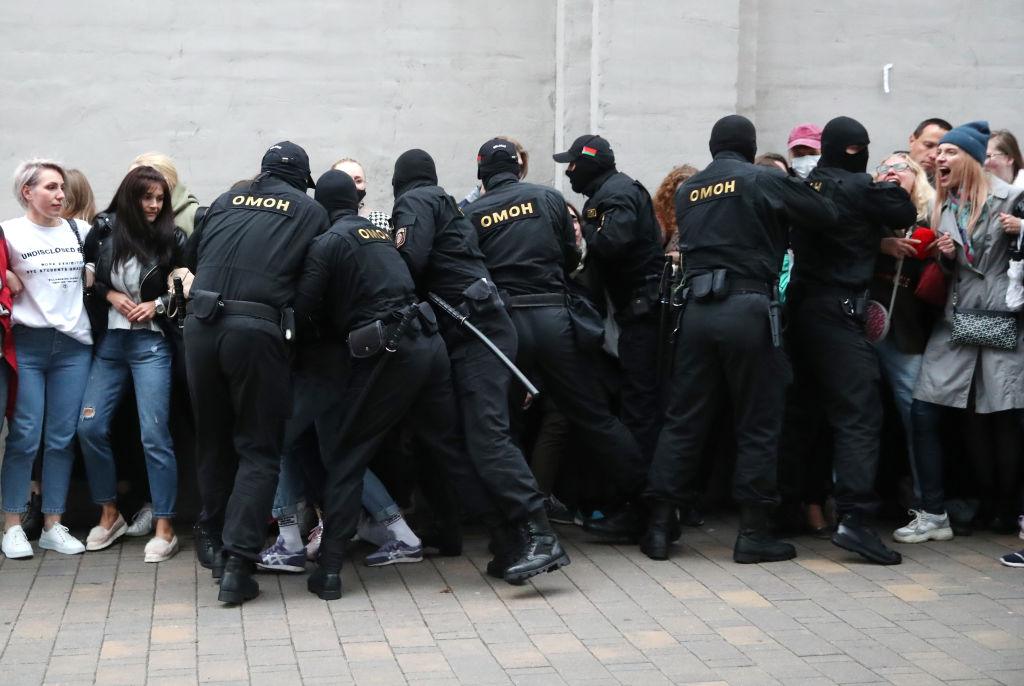
Riot police wade into a crowd of mostly female protesters on 8 September
Very soon the Russian security services, the FSB, showed up at his hotel in the city of Pskov. "They put handcuffs on me and a ski mask covered with black cloth," says Andrei. "Then they attached a dumbbell to the handcuffs - it was so heavy, more than 30kg of metal. I thought they might throw me in the lake with this dead weight, and I wouldn't be able to swim. When you can't see anything, you have no idea what's going on."
The FSB officers, who did not introduce themselves, drove for four hours to the Belarusian border. Then they stopped, took Andrei out of the car, and removed his mask and handcuffs.
"The FSB tried to act like they were not involved in my arrest," he says. "They gave me back my things and told me to walk along the road. I saw some [Belarusian] KGB agents approaching so I didn't hang about, I ran into the forest," says Andrei. "They chased me but they couldn't keep up, so I managed to escape."
Dressed in no more than his jeans, trainers and a T-shirt, Andrei sought refuge among thick forests of pine and birch, lakes and treacherous marshes. He immediately threw away his three mobile phones, to avoid being traced. He had no food apart from some chocolate bars and a bottle of water. Once he slipped into a swamp up to his waist and couldn't move his legs. Fortunately he was able to reach some thick reeds, but it took all his strength to haul himself out.
Then there was a close encounter with a wild boar - "a huge beast with tusks", he says. "I managed to dazzle it with my torch and it ran off but it was very scary being alone at night in the forest."
After 10 days of wandering in circles and getting hopelessly lost, Andrei eventually reached Poland, where he applied for asylum.

According to Evgeny Yushkevich, a former senior Belarusian police investigator now in Lithuania, at least 350 men and women from the police and other law enforcement bodies have resigned from their jobs.
Together with activists who helped supply hospitals with food and protective equipment when Covid first struck last spring, he launched a scheme to help people in Andrei's situation. Bysol, which stands for Belarusian Solidarity, offers financial and legal support for police and other state employees who left their posts in protest against state sponsored violence and election fraud.

Police hold handcuffed demonstrators face-down on the floor on 25 October
Mikita Mikado, who founded a software company in Minsk called Panda Doc and later moved to Silicon Valley, came up with a similar initiative. His project, ProtectBelarus.org, offers retraining in the tech industry for Belarusian police officers who refused orders to attack protesters. "I appeal to Belarusian security officials," the tech entrepreneur wrote on his Instagram account, "if you want to be on the side of good, but finances do not allow, write — I will help." Soon afterwards, the site said it had received 594 applications from police officers.
Apart from offering ex-cops pathways to new careers, Mikado said he would help to pay off loans. Belarusian police are effectively "indentured employees" because they are paid upfront at the beginning of their contract, so when they break it they are immediately in debt to the state.
Andrei, however, who repaid the state without Mikado's help, doesn't plan on retraining because he wants to go home as soon as possible.
Another disenchanted police officer, Ivan Kolos, explains how he escaped arrest
He's in contact with the exiled opposition leader, Svetlana Tikhanovskaya - the woman many Belarusians now consider their legitimate president - and hopes one day to help her end a culture of violence in Belarusian law enforcement. The response to the protests was just the most extreme example of a tendency to violence that had always existed, he says.
"I think it's a kind of herd instinct," he says. "In police departments there are sinks used to wash away blood - the floor can get soaked with blood. So they call the place near the sink the Wailing Wall. I don't know if they think all this is funny or not, but after doing horrible things to people they'd sit with their mates and chat and laugh… it looked like pure sadism to me. I know they enjoyed it, the excitement and the adrenaline."
He adds that many police and special forces officers have signed papers which absolve them of responsibility for their actions, as they are supposedly protecting the state at a time of crisis.
According to human rights groups, to date, more than 19,000 people have been arrested, thousands have been beaten and some horrifically tortured in police stations and detention centres.
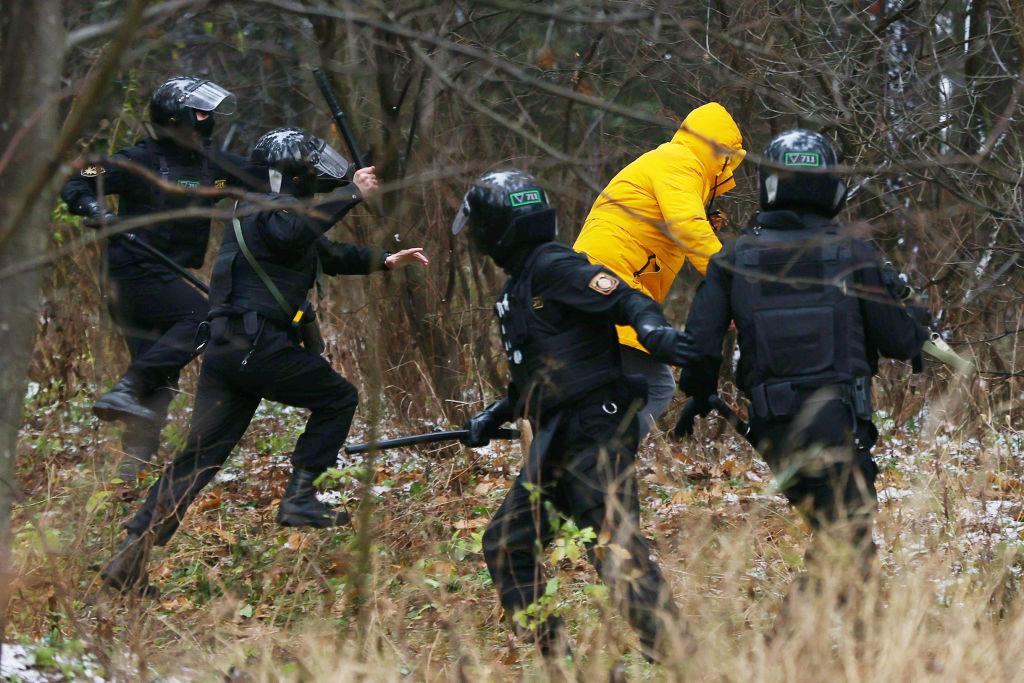
Police chase a demonstrator on 22 November
I asked the Belarusian Interior Ministry's spokeswoman Olga Chemodanova to comment on these numbers and the allegations of mistreatment. She wrote back to say she was not yet in a position to comment.
Some in the opposition believe that one way to disempower the security services is to expose and shame them individually, either by physically pulling the balaclavas from their faces - or, more controversially, by uploading on social media any photographs they can get hold of. Names, addresses and phone numbers are often published too.
"One of the best tactics against the police and Omon is not open warfare, fighting on the streets," says Stepan Svetlov, the 22-year-old founder of a channel on the social messaging app, Telegram, that has helped to co-ordinate the Belarusian protests.
"Instead we are fighting an information war. We have to keep up the psychological pressure on them and on their families because it does have an effect."
Svetlov's channel is called Nexta, meaning "someone", and sitting in his small Warsaw office he tells me that it gets the data about these officers in leaks from whistleblowers or "cyber-partisans" inside government ministries.
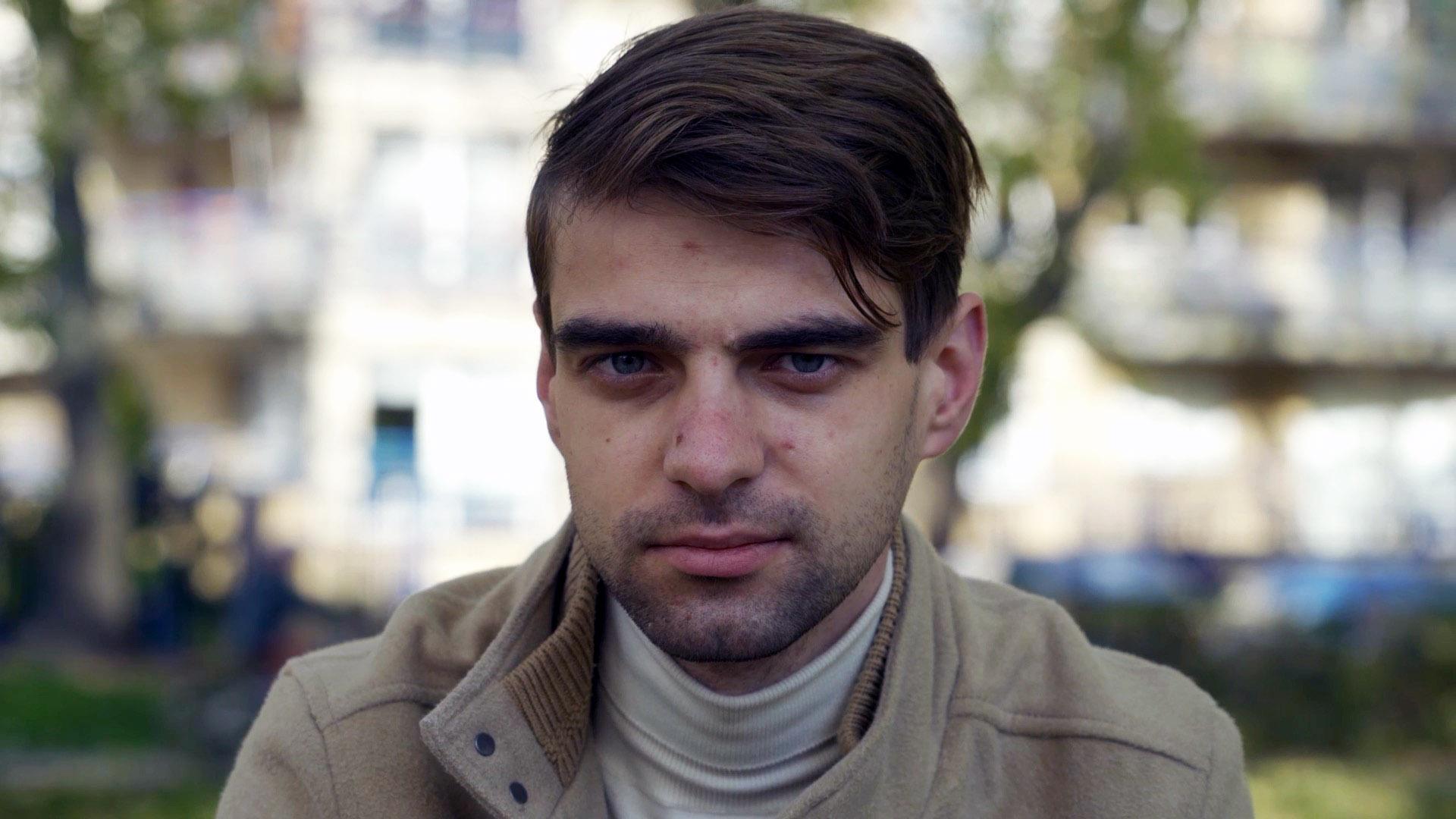
But Andrei Ostapovich argues that attempts to publicly shame police officers could increase their determination to crush the protests with violence.
"They know they are tied to this current government and if it gets changed, they would end up in court," he says. "When citizens start insulting the riot police, calling them 'inhuman and fascists', they are under constant negative pressure and they become even more aggressive."
President Lukashenko appears to agree. Although he has hinted in the last few days that he could step down, he recently warned some Russian journalists that if he fell, the country would fall with him, external, including those who protect him.
"Guys in the Omon, the riot police and many others, like that guard sitting over there", he said pointing to his security guard. "Why should they be blamed? And yet they would be slaughtered - torn to pieces - if I'm forced out."
You may also be interested in:
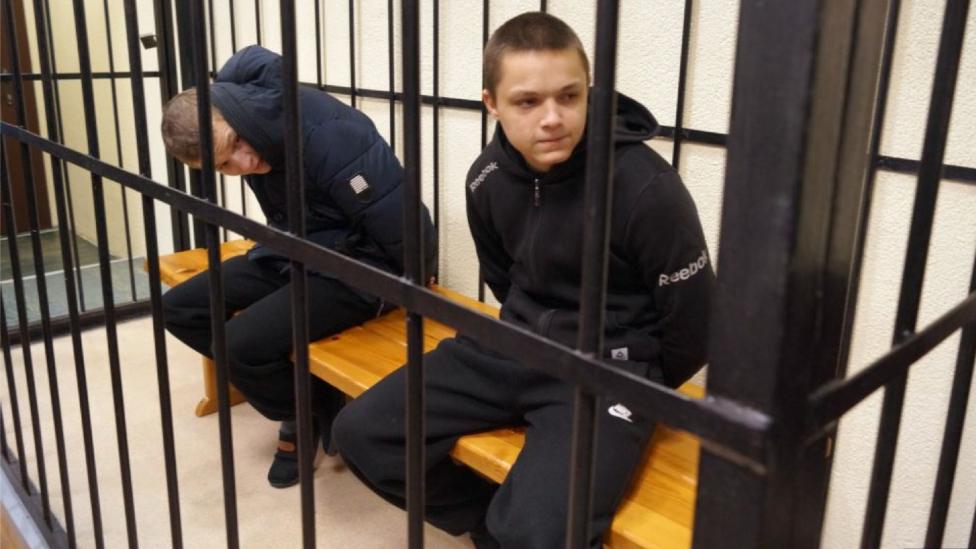
Hanna Kostseva was in court when her two brothers, Stanislaw and Ilya, aged 19 and 21, were sentenced to death for murder. She and her mother will never find out when they were shot, or where they were buried.